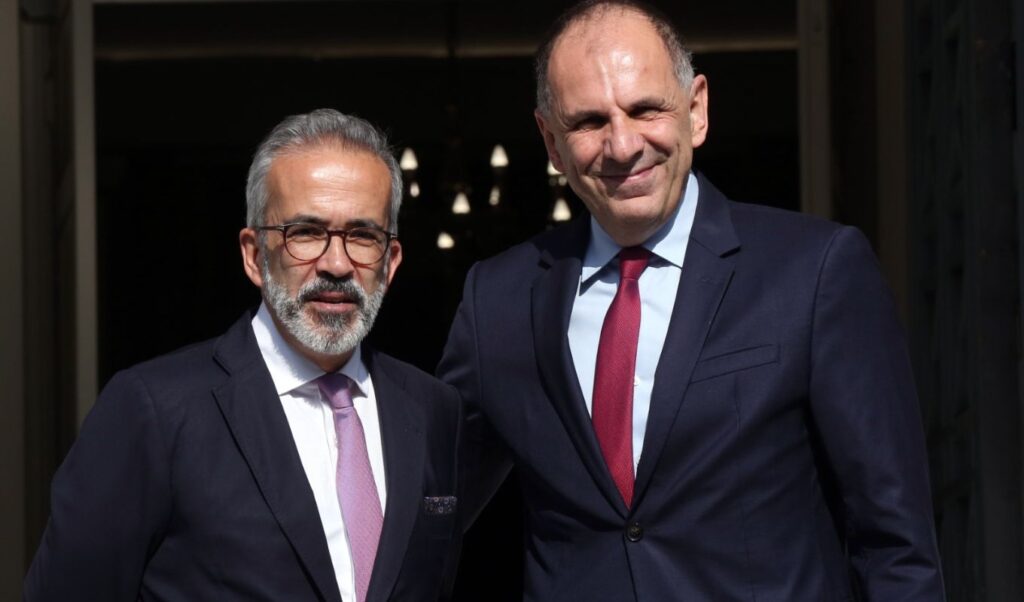Foreign Minister George Gerapetritis, in his statements following the meeting with his Portuguese counterpart Paulo Rangel in Athens, emphasized the close bonds of friendship between Greece and Portugal and the convergence of the two countries as partners in the EU and allies in NATO.
He highlighted their shared commitment to international law, peaceful resolution of disputes, and maritime security, while referring to the challenges facing Southern Europe and the need for Europe’s strategic autonomy. Mr. Gerapetritis emphasized the cooperation between the two countries in addressing crises such as those in Ukraine and the Middle East, and the joint Greece-Portugal initiative to support the Palestinian Authority. He made special reference to migration, highlighting the importance of European solidarity and thanking Portugal for its contribution through FRONTEX.
He also praised the cooperation in international organizations and mutual support for both countries’ participation in the UN Security Council. In closing, he referred to the common historical experiences of Greece and Portugal, emphasizing their shared values of democracy, peace, and creation, invoking the saying of Nobel laureate José Saramago: “Creating is always much more exciting than destroying.”
Full statements by George Gerapetritis
I welcome to Athens my colleague and friend, Portugal’s Foreign Minister, Mr. Paulo Rangel. A distinguished academic and visionary European politician.
Greece and Portugal are connected by strong bonds of friendship that rest on many levels.
As partners in the European Union and allies in NATO, we are inspired by common principles and values. Respect for international legal order, the security of peoples, and commitment to the peaceful resolution of disputes.
As “geographical allies” of Southern Europe, we face similar challenges and converge on many crucial issues concerning our foreign policy priorities and security challenges of the broader region.
As nations with long maritime traditions, we attach particular importance to maritime security, safeguarding freedom of navigation, and respecting the rules of International Law of the Sea.
For almost the last 4 years, Europe has been tormented by crises that directly affect us.
Greece and Portugal have a common understanding of the wars and crises raging in our broader region, in Ukraine, the Middle East, Africa. Within the framework of our harmonized action, we submitted jointly and in time a request to provide European assistance to the Palestinian Authority for building resilient institutions, which are necessary for new governance in Gaza.
At the October Foreign Affairs Council, for the first time in years, we had optimistic news of achieving a ceasefire in Gaza. And we must all work to maintain it, as well as for the massive provision of humanitarian aid to the civilian Palestinian people.
To this fluid situation is added the increasing geopolitical instability globally. And here we seek a stronger role for the European Union. We converge with Portugal on the crucial issue concerning Europe’s future: the need to establish its strategic autonomy that will make Europe a strong geopolitical union.
Honorable Minister,
During today’s meeting, we examined ways to deepen our cooperation, especially in the areas of trade, infrastructure, energy. We also agreed to strengthen our cooperation in civil protection.
We also had a discussion on migration. It’s an issue that concerns our meetings in the MED 9 forum as well. We look forward to the effective implementation of the Migration Pact, as a tool for the common European solution to the European migration issue, based on solidarity and fair burden-sharing among EU member states.
At this point, I would particularly like to thank Portugal for the active support it provides through FRONTEX in the effort to guard the external European borders.
At the same time, we will continue to work together to strengthen our cooperation with third countries, aiming to control migration flows and establish legal migration pathways.
We also agreed to intensify our already excellent cooperation within international organizations, aiming to address modern international challenges and promote global peace and multilateralism.
Greece is today a member of the UN Security Council thanks also to Portugal’s support. And we will warmly support Portugal’s candidacy for the Security Council for the 2027-2028 period, as confirmation of the excellent relations between our two countries. We perceive Portugal as our natural successor, immediately after completing our own term on the Security Council.
We also look forward to closer cooperation within the Community of Portuguese-speaking Countries, in which Greece participates as an associated observer country.
Dear Paulo,
Our two countries have parallel historical experiences. The painful totalitarianism and the restoration of democracy in the mid-1970s. The reef of economic crisis in the 2000s. But also our integration into the European family in the 1980s, as well as our integration into the Eurozone.
In a world challenged by multiple universal challenges, Greece and Portugal persist in timeless human values and seek synthesis, peace, and creation.
I think we are perfectly expressed by the proposal of the great Portuguese Nobel laureate José Saramago, in his emblematic work “A Caverna (The Cave),” inspired also by Plato’s Republic, an ode to the free man:
“Creating is always much more exciting than destroying.”
With these thoughts, dear Paulo, I welcome you to Athens and thank you for our valuable friendship and cooperation.




